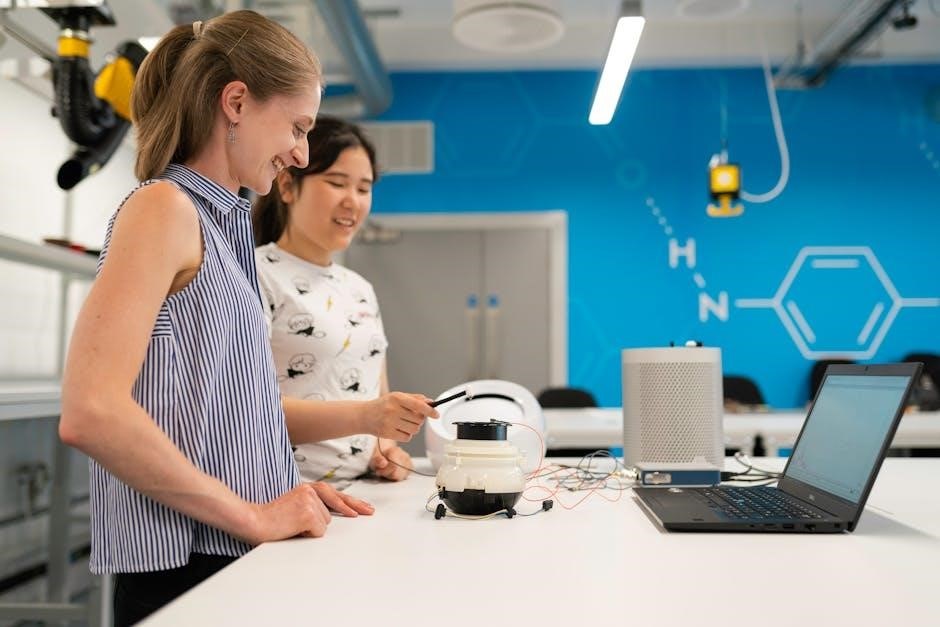The SOP for MS in Computer Science is a crucial document that bridges your academic background, technical skills, and career aspirations, showcasing your readiness for advanced studies.
1.1 Importance of SOP in MS Admissions
The SOP holds significant weight in MS admissions, serving as a personalized narrative that complements other application documents. It provides insight into an applicant’s journey, skills, and motivations, offering a qualitative dimension beyond quantitative metrics like grades and test scores. The SOP allows applicants to highlight unique experiences and achievements, showcasing their fit for the program and alignment with its objectives. It also bridges past experiences with future career goals, demonstrating readiness for the challenges of the MS program. Essentially, the SOP humanizes the application, offering a story that underscores the applicant’s potential and commitment to their academic and professional aspirations.
1.2 Overview of the Structure and Content

A strong SOP for MS in Computer Science typically follows a structured format, beginning with an introduction that outlines the applicant’s academic background and technical skills; The document then transitions into career goals, explaining why pursuing an MS degree is essential for achieving them. Research interests and alignment with the program are emphasized, showcasing how the applicant’s aspirations match the university’s strengths. Personal anecdotes and unique experiences are woven throughout to add depth. The SOP concludes with a vision for future contributions, both academically and professionally, aligning with the program’s mission. Clarity, specificity, and a professional tone are paramount throughout the narrative.
Key Sections of a Strong SOP for Computer Science
A strong SOP for MS in Computer Science includes sections on academic background, career goals, and research interests, ensuring a cohesive narrative of your qualifications and aspirations.
2.1 Academic Background and Technical Skills
Your academic background and technical skills form the foundation of your SOP. Highlight your undergraduate studies in Computer Science, relevant coursework, and programming proficiency in languages like C, Java, and Python. Discuss projects that demonstrate your problem-solving abilities and technical expertise. Mention any research experiences or internships that have equipped you with practical skills. Emphasize how your academic journey has prepared you for advanced studies and aligned your technical abilities with the program’s offerings. This section should clearly showcase your readiness to excel in a graduate program.
2.2 Career Goals and Motivation for Pursuing MS
Your SOP should articulate a clear vision for your future in Computer Science. Explain how pursuing an MS aligns with your long-term career goals, whether in research, industry, or innovation. Highlight what motivates you to advance your knowledge, such as a passion for solving complex problems or a desire to contribute to emerging technologies. Link your aspirations to the skills and expertise you aim to gain through the program. This section should demonstrate how the MS degree will bridge your current abilities and future ambitions, showcasing your commitment to growth in the field.
2.3 Research Interests and Alignment with the Program
Your SOP should clearly outline your research interests and how they align with the program’s strengths. Be specific about areas like AI, data science, or cybersecurity, and explain why they excite you. Highlight how your past projects or coursework have prepared you to explore these interests further. Identify faculty members or research groups at the university whose work resonates with your goals and explain how collaborating with them will help you achieve your academic and professional objectives. This section showcases your readiness to contribute meaningfully to the program and its research community.

Writing Tips for a Compelling SOP
Write clearly and concisely, using active voice. Avoid jargon and ensure each paragraph flows logically. Start with a strong hook to grab attention and use specific examples.
3.1 Clarity, Conciseness, and Tone
Clarity and conciseness are essential in an SOP. Use simple, direct language to convey your ideas without unnecessary complexity. Avoid jargon and ensure each paragraph focuses on one idea. Maintain a professional yet personal tone, reflecting your passion for computer science. Be concise by eliminating redundant phrases and sticking to the word limit. A clear structure ensures readability, while a confident tone showcases your commitment. Use active voice and strong verbs to convey determination. Ensure your SOP is free of errors and flows logically, making it engaging and persuasive to the admissions committee.
3.2 Highlighting Unique Experiences and Achievements
Highlighting unique experiences and achievements in your SOP showcases your distinct qualifications; Emphasize specific technical projects, research, or internships that demonstrate your expertise in computer science. Quantify achievements, such as completing a challenging coding project or publishing research. Share personal anecdotes that reveal your problem-solving skills and passion for the field. Avoid generic statements; instead, provide concrete examples that highlight your contributions and innovations. This helps the admissions committee understand your potential to excel in the program and stand out among applicants. Use these experiences to align your narrative with the program’s strengths and opportunities. Be authentic and let your story shine.

Common Mistakes to Avoid
- Overly generic statements that fail to highlight unique experiences or align with the program’s specifics.
- Lack of specificity about why the chosen program is the best fit for the applicant’s goals and interests.
4.1 Overly Generic Statements
Avoid using overly generic statements that lack personalization and specificity. Phrases like “I am passionate about computer science” without concrete examples weaken your SOP. Admissions committees review numerous applications, and generic statements fail to differentiate you. Instead, focus on unique experiences, such as specific projects, skills, or research that highlight your expertise and alignment with the program. For example, instead of saying “I want to innovate in tech,” describe a project where you solved a real-world problem using machine learning. Specificity makes your SOP memorable and demonstrates genuine interest in the program.
4.2 Lack of Specificity About the Program
Avoid writing a SOP that lacks specific details about the program you are applying to. Generic praise or vague statements about the university or department do not demonstrate genuine interest. Instead, research and mention specific aspects of the program, such as faculty research, courses, or resources that align with your goals. For example, highlight a professor whose work matches your research interests or a unique lab or facility that will aid your studies. This shows you have done your homework and are genuinely excited about the program, making your application stand out. Specificity strengthens your case.

Sample SOPs and Case Studies
Reviewing sample SOPs and case studies provides insights into successful strategies, highlighting how applicants effectively communicate their goals, experiences, and alignment with specific programs in computer science.
5.1 Analyzing Successful SOP Examples
A strong SOP for MS in Computer Science showcases clarity, passion, and alignment with the program. Successful examples highlight a clear academic background, technical skills, and career motivation. They demonstrate research interests and how they align with the program’s strengths. SOPs often include specific projects or experiences that illustrate problem-solving abilities and innovation. Emphasizing unique achievements and a vision for the future sets standout applications apart. These examples serve as valuable guides, offering insights into how to effectively communicate one’s qualifications and aspirations in a compelling narrative tailored to the program.
5.2 Learning from Common Themes in Sample SOPs
Successful SOPs for MS in Computer Science often share common themes, such as a clear alignment with the program’s strengths and faculty expertise. Applicants frequently highlight specific research interests, technical skills, and career goals, demonstrating how the program will help achieve them. Many samples emphasize unique experiences, such as projects, internships, or research, to showcase problem-solving abilities and innovation. These themes collectively illustrate a candidate’s passion, preparation, and vision for the future. By identifying and incorporating these elements, applicants can craft a compelling SOP that stands out to admissions committees.
A strong SOP is clear, concise, and aligns with the program’s strengths while showcasing your passion and vision for the future. Proofread thoroughly.
6.1 Proofreading and Editing
Proofreading and editing are essential to ensure your SOP is polished and professional. Review for clarity, grammar, and flow, eliminating any redundancies. Seek feedback from mentors or peers to identify areas for improvement. Ensure your technical skills and experiences are highlighted effectively, aligning with the program’s focus. Use tools like grammar checkers to catch errors. Avoid generic statements and ensure every sentence adds value. A well-edited SOP reflects your attention to detail and commitment to excellence, making a strong impression on the admissions committee.
6.2 Submitting a Standout SOP
Submitting a standout SOP requires careful tailoring to the program and demonstrating a clear alignment with its focus. Highlight your unique strengths, such as technical skills, research experiences, and career aspirations. Ensure your SOP is concise, well-organized, and free of errors. Use specific examples to showcase your passion for computer science and how the program will help you achieve your goals. A standout SOP not only reflects your readiness for graduate studies but also differentiates you from other applicants, leaving a lasting impression on the admissions committee.
